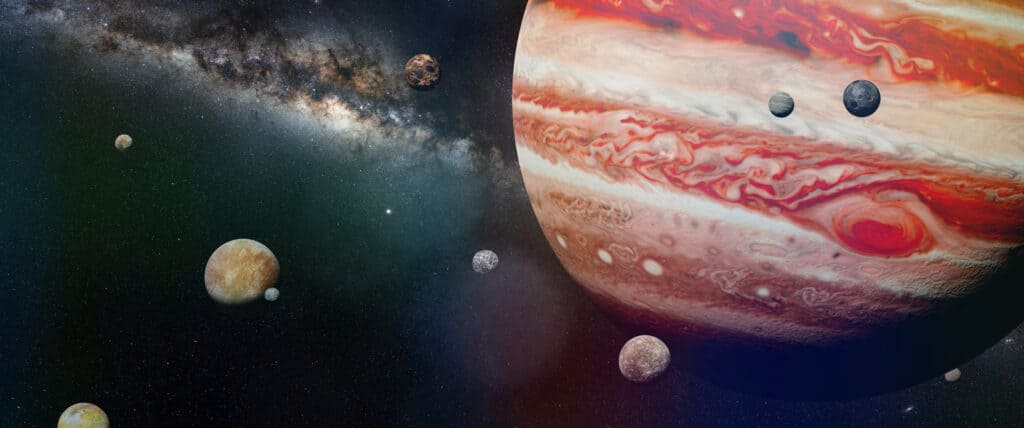Have you ever stopped to think about how Earth got its name? Our world is the largest of four rocky planets closest to the Sun. It’s home to nearly 7.9 billion people and countless diverse species. And our planet is made especially for us to thrive. If it weren’t for the atmosphere containing 21% oxygen, life as we know it wouldn’t exist.
In this article, we’ll explore the origin and meaning of Earth’s name. The name holds a deep connection to human history and cultural identity. We will answer questions such as the etymology and origin of the word Earth, how different cultures perceive and name our planet, and the significance of our planet’s name in various cultures and throughout mythologies. Follow along to learn everything now.
The Origin of the Name Earth

Earth’s name is directly related to the ground and our connection with it.
©sasirin pamai/Shutterstock.com
When was the last time you felt the ground beneath your bare feet? The connection that humans have with the land and the ground is one of the places that ground us.
The name Earth comes from Old English and Germanic words meaning the land or the ground. It’s an Anglo-Saxon term that refers to the ground on which people walk and sow their crops. And since sowing crops was one of the only ways to survive, it makes sense that this would be the name for our planet. To this day, major farms like this one can shape the way we experience life.
The word Earth also shares linguistic roots with other Indo-European languages. For instance, the Dutch word “aarde” and the Old Norse word “erda” are related. You can also find similar earth-like words in various languages.
Historical Background

Other planets, like Jupiter, are named after gods and goddesses, but not Earth.
©iStock.com/dottedhippo
The tradition of planet naming dates back to Babylonian times and was later adopted by the Greeks and Romans when naming other planets. The Romans and Greeks used gods and goddesses to name celestial bodies, but they didn’t do so for Earth.
Different cultures and languages have their names and associations with Earth and other celestial bodies. Native American tribes referred to Earth with names like “Turtle Island” and “Mother Earth.” Both of these names symbolize our planet’s nurturing qualities. In ancient Egypt, Earth was called “Jeb” or “geb,” associated with growth and fertility.
As you explore different ancient civilizations, you’ll see that Earth’s name varies across cultures. Each variation reflects the culture’s unique beliefs and cosmologies.
Significance and Symbolism

Earth is the fifth largest planet in the solar system.
©19 STUDIO/Shutterstock.com
Earth plays a major role as the fifth-largest planet in the solar system. It’s located an average distance of 93 million miles from the Sun. In Norse mythology, Earth was personified as the goddess “Jord.” She was seen as the mother of Thor. The idea of the Earth being a mother fits many creation myths.
Like a mother, many creation myths highlight Earth as the foundation and source of life. And then there’s the grounding and stability side of our planet.
Earth symbolizes the ability to feel grounded, whole, and centered. It’s all about having a connection to nature and being in tune with the different rhythms and seasons of time. Our planet’s name is often associated with abundance, fertility, and the life cycle.
The Naming Process: How You Name a Planet

Early civilizations didn’t have a unified system for naming planets.
©SN VFX/Shutterstock.com
Can you imagine what it would be like to name a planet? Every day, soon-to-be parents struggle with lists of baby names, trying to find the perfect one for their child. Sometimes, trying to choose a name for a new baby can cause major fights in relationships. So there must have been a little bit of turmoil when it came to choosing the name for an entire planet.
We do know the planet naming process was messy, to say the least. Early civilizations didn’t have a unified naming system for celestial bodies as they did for mountains or rivers. Yet, despite these difficulties, the word Earth has been used for centuries, evolving as languages and civilizations developed.
Alternative Names and Adaptations

Earth has also been described as “terra” and “orbit”, which are two different Latin terms.
©Harvepino/Shutterstock.com
Was our planet always going to be called Earth? Or was there another name on the table? In the past, Latin terms like “terra” and “orbit” have been used to describe Earth, specifically the land and the globe, respectively. There were also proposed alternative names for Earth, such as Gaia and Telus, but these names didn’t gain enough popularity.
The name Earth resonates with this connection to the ground. It reflects our planet’s fundamental feature, which is important to human existence, land.
The name Earth has remained relatively stable throughout history. As scientific knowledge advanced, the name became associated with the celestial body rather than just the ground we walk on. Hundreds of years ago, when somebody said Earth, they might not have referred to the entire planet. But over time, our world began to become known as Earth. This just goes to show that humans have an intense connection to the ground.
Final Thoughts
Can you imagine what life would be like if our planet wasn’t called Earth? It seems like the name has stuck throughout the centuries because it resonates with so many people. Earth is all about the ground that we walk on. And without the ground, how would we get around or eat food? We need the soil and all the opportunities it offers us for survival.
The names for Earth in different languages share a common theme related to soil or ground. And this name shapes our understanding of our home in the vast cosmos. Our planet’s name also reflects linguistic roots in Old English and Germanic languages.
And finally, the word Earth deepens our connection to the world and our place in the universe. It’s a testament to the diverse cultural perspectives that shape our understanding of life as we know it.
By exploring the significance of our planet’s name, we can truly appreciate the interplay between culture, language, and our relationship with nature. Every language has its own name for our planet, but all of those names share a common theme related to the ground beneath our feet.
The photo featured at the top of this post is © iStock.com/KingJC
Thank you for reading! Have some feedback for us? Contact the AZ Animals editorial team.







